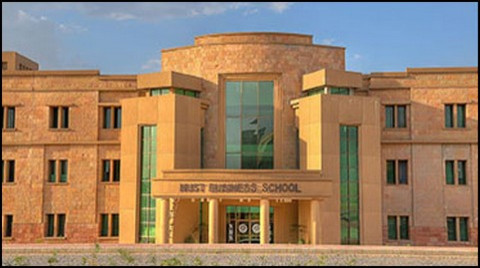No Blue Jeans Or Tight Dresses, Please, We’re Pakistani

The National University of Sciences and Technology, a public research university in Pakistan, has apparently warned its female students against wearing blue jeans or tight-fitting clothes, lest they be fined.
Dawn, an English-language Pakistani daily, reported that some co-eds have been hit with fines of 500 to 1,000 rupees (about $4.75 to $9.50) for not wearing the dupatta, the traditional long garment favored by many South Asian women.
The newspaper reported that management at NUST, which has campuses across Pakistan, has made wearing the dupatta mandatory, but NUST officials have denied they have issued such an explicit edict – rather, they claim they want their female students to dress “decently.”
NUST’s personal staff officer, Col. Mohsin, told Dawn that: “Shorts are not allowed [on] university’s premises. As far as [the] hijab is concerned, it is up to the will of parents.”
An unnamed faculty member told the paper that the atmosphere on campus is very strict, since most of the top administrative officials are former army officers. (Indeed, NUST was originally founded as a research-education institution for military personnel.)
“Male and female students are not allowed to sit together and they are fined for violation,” he told Dawn. “Teachers and students know that they will be fired and [suspended] if they do anything against the will of the administration.”
Reportedly, the students at the Islamabad and Rawalpindi campuses are greatly irritated by the conservative climate at the school, likening it to a “military academy.”
An op-ed in the Pakistan Express Tribune by Syed Nadir El-Edroos, a teacher of economics at Bellerbys College in London, blasted the apparent (but unofficial) dress code at NUST.
“The lazy assumption that regimentation, discipline and uniformity makes one educated died [an un-mourned] death back in the early 20th century,” El-Edroos wrote. “Individuals associated with the military, bureaucracy or civil service who then venture into the education sector impose what they know to be the best system -- or at the very least what they believe works best for themselves.”
El-Edroos called such a ban the result of having administrators with “little or no background in formal education.”
“This patronizing and condescending attitude of educational institutions towards their students which assumes that adults are unable to make good choices for themselves does little to help young adults mature and broaden their exposure if they continue to be treated as if they are in school,” he added.
“Higher education, or indeed any form of education, should be about inclusiveness, reducing barriers and encouraging individualism. These institutions are subsidized by the taxpayer, receive state land at a subsidized rate. To say, students should have to leave an institution of higher learning because of the clothes they wear does not conform to the administration’s world view shows how warped our idea of what education is and should be actually is.”
© Copyright IBTimes 2024. All rights reserved.




















